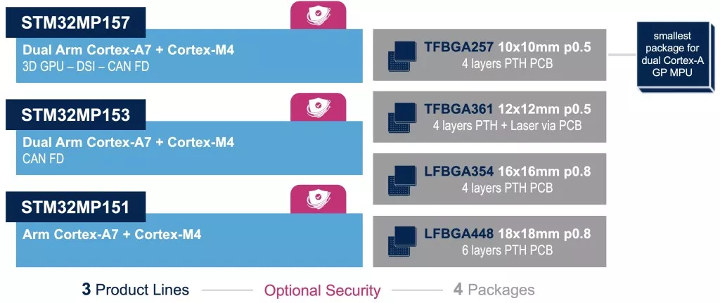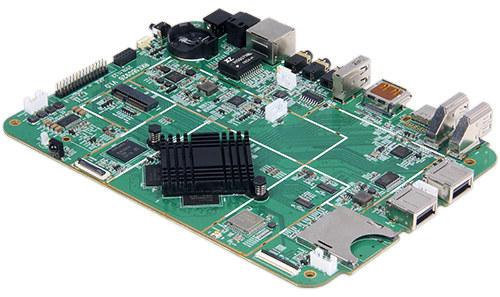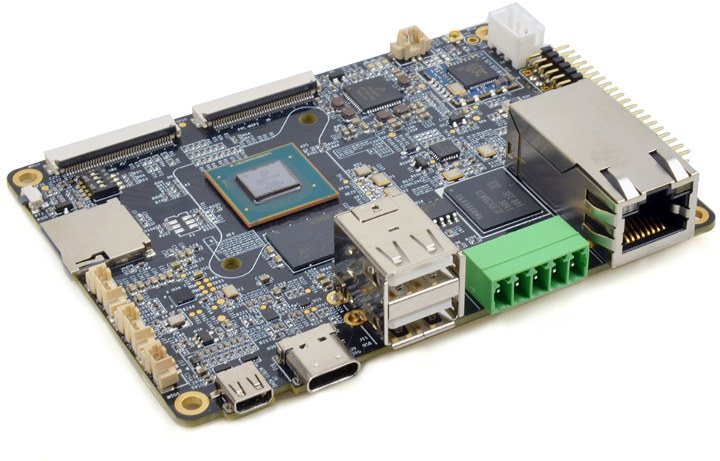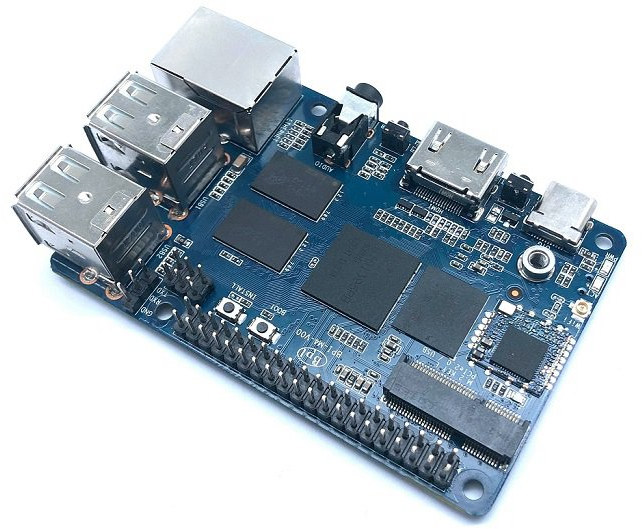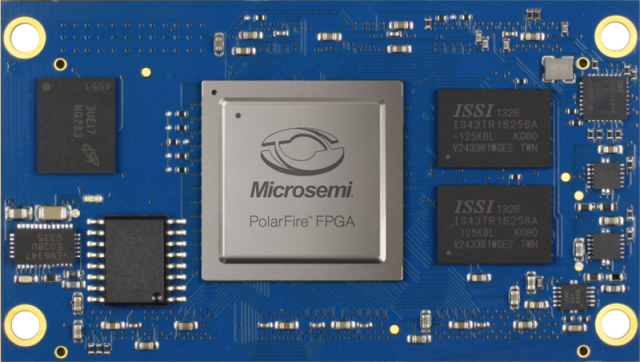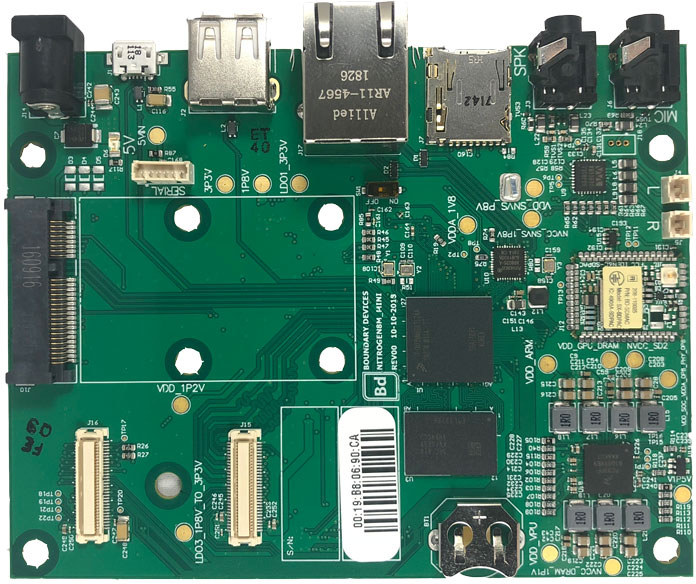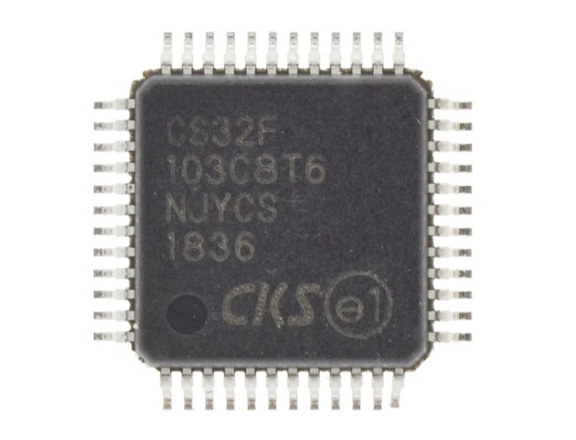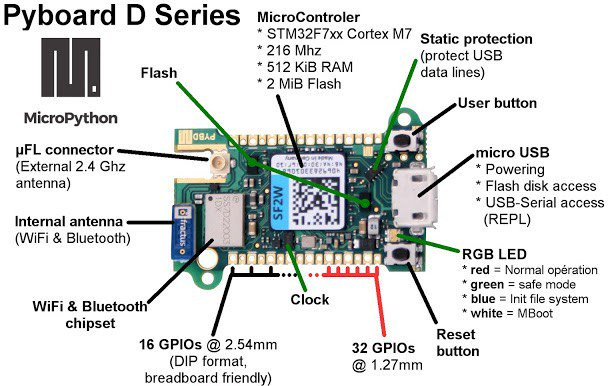When Linux 4.17 was released last June, we discovered an interesting new STM32 part: STM32MP157C dual core Cortex-A7 processor. It was the first time I saw an STM32 IC not based on Arm Cortex-M microcontroller core, but we knew only very little details at the time. STMicro has now made it official, and introduced STM32MP1, the first STM32 MPU (Microprocessor Unit) that features one or two Arm Cortex-A7 cores running Linux, as well as an Arm Cortex-M4 real-time core that allows to re-use code from existing STM32 projects. STM32MP1 key features and specifications: Cores Single or Dual Cortex-A7 core(s) running at 650 MHz with 32-Kbyte L1 Instruction cache, 32-Kbyte L1 Data cache, 256-Kbyte Level 2 cache Cortex-M4 core running at 209 MHz with single-precision floating point unit (FPU), digital signal processor (DSP) instructions, and memory protection unit (MPU) GPU (STM32MP157 only) – Vivante 3D GPU with OpenGL ES 2.0 support; […]
Geniatech DB3399Pro RK3399Pro Development Board Comes with 8 USB Interfaces
Rockchip RK3399Pro is an upcoming processor based on Rockchip RK3399 hexa-core processor, but adding RK1808 NPU block for AI workloads. We’ve already seen a few development boards based on the processor, including Rockchip’s own evaluation board – which mortals can’t buy -, Khadas Edge 1S, Pine64 RockPro64-AI, and Toybrick RK3399Pro Board. Apart from a demo with Rockchip RK3399Pro EVB, I have not seen any of the SBCs in the wild yet. But we have even more choices now, as Geniatech, better known for their Amlogic TV boxes, has been entering the embedded mainboard market in recent years, and added DB3399Pro development board to their offering. Geniatech DB3399Pro specifications: SoC – Rockchip RK3399Pro hexa-core processor with 2x Cortex-A72 @ 1.8 GHz, 4x Cortex-A53 @ 1.4 GHz, Arm Mali-T864 GPU, RK1808 NPU System Memory – 3GB LPDDR3 (option 6GB) Storage – 8GB eMMC flash (option 16G/32GB), SD card socket, SATA (where?) Video […]
Pico-ITX i.MX8M Board Enables Offline Voice Control with Snips
A few days ago, we covered Estone Technology’s MJ-100 RK3399 rugged tablet. I’ve just realized Estone Technology used to promote their embedded product under the Habey USA brand, which we covered a few times here, and the company has also announced another new product ahead of Embedded World 2019 with their EMB-2238 Pico-ITX i.MX8M board specifically designed for voice control applications. The company setup two voice control demos with the board: one with Amazon Alexa Voice Service (AVS) and another with Snips that works locally without any Internet connection. We actually came across Snips previously for an article comparing microphone arrays, but I never looked into Snips into details or saw an actual demo. Let’s have a quick look at EMB-2238 board specifications first: SoC – NXP i.MX 8MQuad with 4x Arm Cortex-A53 cores @ 1.5GHz, 1x Arm Cortex-M4 realtime-core @ 266MHz, Vivante GC7000L/GC7000LVX with support for OpenGL/ES 3.1, OpenGL […]
Banana Pi BPI-M4 Board Comes with RTD1395 Processor, M.2 Socket, Raspberry Pi 3B+ Form Factor
Realtek RTD1395 processor is a lower cost version of RTD1295 / RTD1296 processors found in mid-range TV boxes often including HDMI input and output such as Zidoo X9s or LAKE I Home Cloud. The new processor comes with a lower-end Mali-470MP4 GPU and removed some interfaces like HDMI input and native SATA. So far, we had seen very few hardware platforms built around the processor, but SinoVoIP has just unveiled their latest Banana Pi BPI-M4 board powered by Realtek RTD1395 processor, following Raspberry Pi 3B+ form factor, and adding an M.2 key E socket with PCIe 2.0 and USB 2.0 signals. Banana Pi BPI-M4 specifications: SoC – Realtek RTD1395 quad-core Arm Cortex-A53 processor with Mali-470 MP4 GPU System Memory – 1 GB DDR4 (option 2 GB) Storage – 8G eMMC flash (max 64 GB), micro SD slot up to 256GB Video Output – 1x HDMI 2.0 port up to 1080p […]
ARIES M100PF PolarFire FPGA System-on-Module Targets Industrial Applications, RISC-V Development
MicroSemi unveiled PolarFire RISC-V FPGA SoC at the end of last year, bringing an alternative to Xilinx Zynq (Arm Cortex-A9 + FPGA) and UltraScale+ (Cortex A53 + FPGA) SoCs. The system-on-chip is expected to be mass produced later in 2019, so development is done on HiFive Unleashed RISC-V board and its FPGA expansion board. In the meantime, MicroSemi PolarFire FPGAs (without RISC-V hard core) are available now, and ARIES Embedded planning to showcase what they claim is the first PolarFire FPGA system-on-module at Embedded World 2019 with their M100PF SoM targeting industrial applications. ARIES Embedded M100PF key features and specifications: A choice of 3 PolarFire FPGAs MPF100T – 109KLE, 336 Math Blocks (18x18MACC) MPF200T – 192KLE, 588 Math Blocks (18x18MACC) MPF300T – 300KLE, 924 Math Blocks (18x18MACC) System Memory – 512 MiB / 1 GiB / 2 GiB DDR3 RAM Storage – 256 MiB configuration device, 4 GiB eMMC flash […]
Nitrogen8M_Mini is the First NXP i.MX8 8M Mini SBC
Having just written about one of the first NXP i.MX 8M Mini systems-on-module, let’s stay with NXP’s latest 14-nm processor as Boundary Devices have been working on a variant of their Nitrogen8M SBC based on MXP i.MX 8M Mini processor and aptly called Nitrogen8M_Mini. The board is also known as the less human-friendly Nit8MQ_Mini_2r8e SBC, and comes with the following specifications: SoC – NXP i.MX 8M Mini with 4x Cortex A53 cores, 1x Cortex-M4F real-time core, Vivante GCNanoUltra 3D GPU, Vivante GC320 2D GPU System Memory – 2GB LPDDR4 (Optional 4GB version) Storage – 8GB eMMC flash, expandable up to 128GB, UHS SD card slot Display – 4-lane MIPI DSI interface up to 1080p Video Encode / Decode – 1080p H.264, VP8/1080p60 H.265, H.264, VP8, VP9 Audio – 3.5mm headphone jack, analog MIC jack, 2W audio amplifier, L&R speaker headers Camera Interface – 1x 4-lane MIPI-CSI interface Connectivity Gigabit Ethernet […]
CS32 MCU Clone of STM32 Makes it into Bluepill Board
A few year ago, we covered GigaDevice GD32 MCU based on STM32 Arm Cortex-M3 microcontroller, but with some improvements to the flash and overall performance. So the MCU is not exactly an STM32 clone per se, but it’s pin-to-pin and software compatible. Now based on a discussion on STM32duino forum, it looks like another company (CKS – 中科芯微) may have made an actual clone of STM32 with CS32, more exactly CS32F103 that is compatible with STM32F103. CS32 comes with an Arm Cortex-M3 core clocked at 72 MHz, 64 to 128KB flash, and 20 KB RAM. A datasheet and user manual are available but only in Chinese. Several STM32duino members suspect it’s an actual copy of STM32 without modifications. What’s unclear is whether it’s a pirated copy, or a properly licensed one. CS32F103C8T6 & CS32F103CBT6 parts can be purchased on Aliexpress for $0.80 shipped and up. The datasheet mentions 64KB or […]
Pyboard D Series MicroPython Board Features STM32F7 MCU, WiFi and Bluetooth
Micropython is a lightweight implementation of Python for microcontroller which we covered first in 2013. The port is supported by various hardware platforms, and I even tested Micropython on ESP32 a little while ago, but the developer – Damien George – also launched officially supported boards starting with Pyboard in 2014 with an STM32F4 microcontroller. At FOSDEM 2019, the upcoming Pyboard D-series (aka Pyboard D, or just PyBD) board was introduced during the Micropython presentation with a faster STM32F7 Cortex-M7 MCU, as well as built-in WiFi and Bluetooth connectivity. Pyboard D preliminary specifications: MCU – STMicro STM32F7xx Arm Cortex M7 microcontroller at 216 MHz with 512KB RAM, 2MB flash Storage – micro SD card slot, and 2x external flash chips Connectivity – WiFi & Bluetooth with on-board antenna and u.FL antenna connector USB – 1x micro USB port for power, flash disk access, and USB to serial debugging/programming Expansion 2.54mm […]


